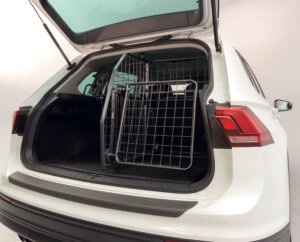We love to go on hiking adventures with our dogs. Regardless of where we go there are often scenarios that we encounter where there is the potential for risk of injury or illness to our dogs. Whether it’s from them leaping from the boot into a car park, drinking from a less-than-fresh stream, or facing a stand off with the local wildlife, we need to be prepared. We’ve got 7 things that we do to try to keep dogs safe, so that we can all enjoy the adventure.
Make sure vaccinations are up to date
This is essential to keep your dog healthy and when meeting up with other dogs en route to avoid any nasty illnesses such as kennel cough. It’s also helpful to have booster jabs against bacterial infections like leptospirosis if your dog likes to go for a swim.
Get your dog microchipped
If your dog gets lost on an adventure, it will be far easier for him to return to you safely if he has been microchipped. It’s a legal requirement in many countries including the UK.
Transport your dog securely
Adding a tailgate barrier to your vehicle allows you to have better control when you open the boot in a busy car park. An excitable dog is deterred from jumping into harm’s way with this easily installed car accessory.

Be vigilant around bodies of water
Illness from ingesting the water from bacteria in the form of leptospirosis or toxins from blue-green algae is something to be alert to. Try to keep your dog away from water that looks stagnant and be sure to wash your dog after he has been swimming in any pond, lake or stream. To keep dogs safe, it is best to avoid swimming in reservoirs, old quarries, and fast flowing bodies of water as even the strongest dogs can get into difficulties in these areas.
Keep your dog on the lead in areas that are harder to navigate
Many people like to allow the freedom of off-lead walking in certain areas, but if the terrain has dangerous drop offs or there are other hazards, or animals in fields, keeping the dog on the lead is advised. Making sure that the lead and harness you use are in good condition and unlikely to break on a hike is equally advisable.
Be fully aware of the weather conditions prior to starting your adventure
Dogs don’t do well in extreme weather. So if you’ve got a spell of hot, humid conditions or very cold, icy conditions, it would be sensible to re-think whether an adventure is appropriate at that time. Body temperature issues and damage to paws in both temperature extremes is likely, so be particularly aware of the forecast in your planned hiking area.
Carry a first aid kit with items suitable for dogs at all times
Even on the easiest of routes, you never know when your dog may get a scrape. Having a well-stocked first aid kit is a great idea, to give quick assistance to an injured dog in the field. One of our older blog posts details what should be in that first aid kit, get details here.